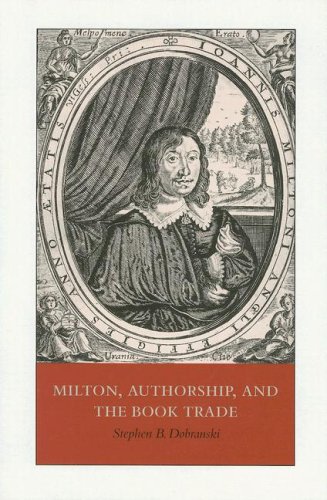Interview with Dr. Stephen Dobranski
Dr. Stephen Dobranksi , a professor in the GSU English Department, joined the faculty in 1996, the year the Summer Olympics came to Atlanta. He has been the English Department’s library faculty liaison for many years. Though we have worked together on many projects, there was much I did not know about his life and work as a Milton/Renaissance scholar. Some recent books authored by Dr. Dobranksi available in the University Library include Milton in Context , A Variorum  Commentary on the Poems of John Milton, and Milton , Authorship, and the Book Trade.
Commentary on the Poems of John Milton, and Milton , Authorship, and the Book Trade.
The following interview gives greater detail concerning his research and teaching.
- What brought you to Georgia State University? When I was looking for a position in 1996 I had two offers. The people at Georgia State University were friendly and welcoming, plus my fiancée (now wife) was offered a position at Georgia Tech. Atlanta was appealing as a place to live, but was very different from Austin, Texas where I did my graduate work.
- What do you like and dislike about Atlanta? We like the parks, restaurants, and our neighborhood Oakhurst/Kirkwood in Decatur. It was hard to get used to the lack of identity in Atlanta: everyone comes from someplace else!
- Why did you decide to become a Milton scholar? In graduate school I liked many authors, but wanted to study an author who was different from the authors I read for pleasure (crime/mystery), so I picked Milton. Over the years I have become fascinated with his views on free will and my interest has deepened.
- What kinds of active learning methods do you use with your students? I call on students, but I also use groups to work on various projects. In one of my classes students in groups have to answer true and false questions about writing a literary essay, while in another class students in groups work on tracking down answers about 18th century publications. My goal with students is to be approachable and good-humored.
- You just finished two books on Milton. What’s next in terms of research? I’m presenting a paper at the Renaissance Institute Summer Symposium on Milton’s depiction of the war in heaven and the political implications of the Areopagitica. I’m also writing two books: an introduction to Milton and a book on his imagery and visual representations of his works.
- Why do you think the study of Milton is relevant to students in the 21st century? Issues from his time are still being addressed in the present day such as moral law versus the laws of society. For example, is it ok to break the laws of man if you are answering a higher call? Plus his poetry and prose is still wonderful and he was a man of great intellect. He created art that still inspires people today.
- If you could travel back in time, where would you go and who would you like to meet? I would like to go back to 17th century London. There’s only so much you can find out from surviving documents. It would be great to have a better understanding of the culture and first-hand knowledge of the events during that century.
- What do you do in your leisure time? My wife and I have a 16 month old daughter, so we spend a lot of time with her and I enjoy teaching her new words. I also like to read for pleasure: Neil Gaiman’s The Anansi Boys ( see these books in GILFind), Steig Larson’s The Girl who played with Fire and The Girl with the Dragon Tattoo, Markus Zusak’s The Book Thief, Charles Dickens’ Dombey and Son, graphic novels, and anything by hard-boiled crime writers such as Dashiell Hammett . We also like to cook and watch Billy Wilder movies.
- What advice do you have for students entering the academic field of English? Know what you really want to do. Make sure this is your passion, not a default career choice. Rewards do come, but slowly. The demands of being a professor are great, but worth it.
- Is there a place or country you would like to visit? I’d like to go to Japan. There’s going to be a Milton conference there. I’d also like to visit other countries in the east like China. I’d like to go back to France and Italy. My wife’s step father is French. We’ve taken our daughter to visit him, but we’d like to go back.